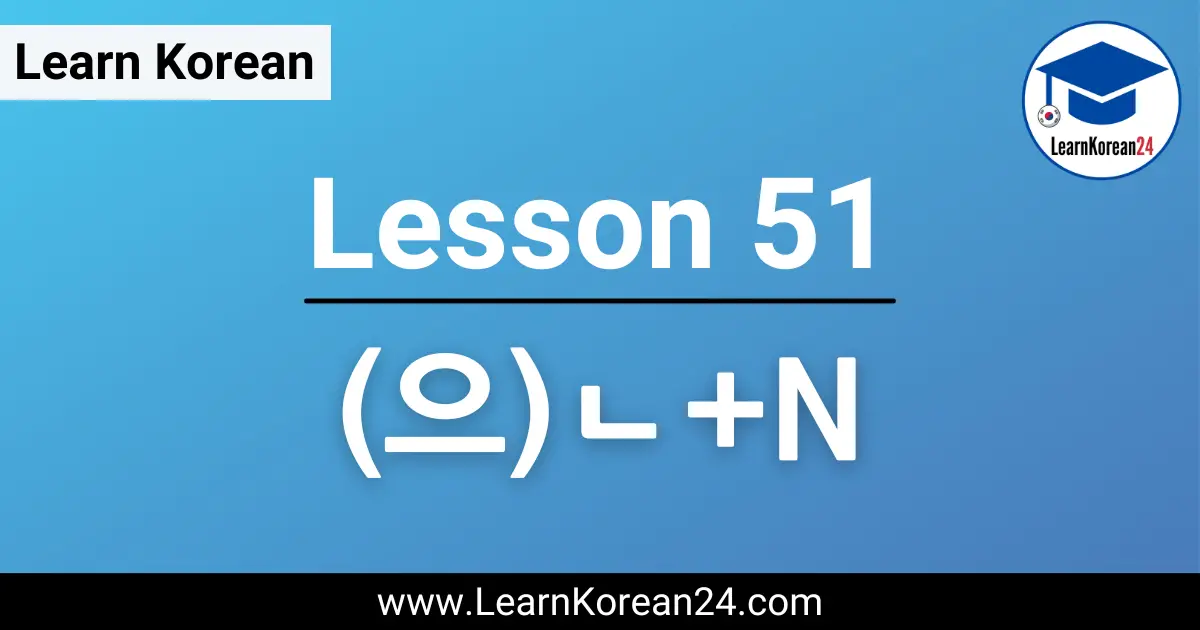Lesson 51: (으)ㄴ+N
In this lesson, you will learn about the noun modifier (으)ㄴ. In English, when adjectives are placed before a noun, they modify the meaning of that noun. For example, in the sentence “I bought a blue pencil.“, the adjective ‘blue‘ modifies the noun ‘pencil‘. In Korean, in order to use adjectives to modify nouns, first, you must change the adjective from its dictionary form into the noun modifying form by using (으)ㄴ.
Lesson 51: (으)ㄴ+N
When you look up adjectives in a Korean dictionary, you’ll notice that they are written in the infinitive verb form. For example, if you look up the adjective ‘big‘ you’ll find it written in the verb form as 크다 (to be big). This is why you may sometimes hear adjectives referred to as ‘descriptive verbs’.
In order to use an adjective to modify a noun, first, you need to change this basic verb form of the adjective and change it into the noun modifying form by adding (으)ㄴ. Let’s look at some examples.
크다 = to be big
큰 집 = a big house
예쁘다 = to be pretty
예쁜 꽃 = a pretty flower
작다 = to be small
작은 가방 = a small bag
조용하다 = to be quiet
조용한 사람 = a quiet person
따뜻하다 = to be warm
따뜻한 거 = a warm one/thing
Conjugation Rules
With regular adjectives, if the adjective stem ends in a consonant, 은 is attached, and if the adjective stem ends in a vowel, ㄴ is attached. However, there are exceptions to these rules. When adjectives end in 있다/없다, the ending 는 is used and not (으)ㄴ. See the table below.
| Conjugation Rule | Examples |
|---|---|
| Adjective Stem Ends In Consonant + 은 | 좋다 (to be good) → 좋은 작다 (to be small) → 작은 |
| Adjective Stem Ends In Vowel + ㄴ | 나쁘다 (to be bad) → 나쁜 크다 (to be big) → 큰 |
| Adjective Ends In 있다/없다 + 는 | 맛있다 (to be delicious) → 맛있는 재미없다 (to be not interesting) → 재미없는 |
| <Irregular Conjugations> | 가깝다 (to be close) → 가까운 낫다 (to be better) → 나은 힘들다 (to be difficult) → 힘든 이렇다 (to be like this) → 이런 |
Things To Note:
When using more than one adjective in a sentence, only the last adjective includes the noun modifier (으)ㄴ, and the adjectives are connected with 고 (Check Lesson 32 for a review of 고).
싸고 좋은 옷(O) = cheap and nice clothes
싼고 좋은 옷(X)
Example Sentences
민호는 좋은 학생이에요. = Minho is a good student.
저는 큰 가방을 좋아해요. = I like big bags.
오늘 어려운 숙제를 받았어요. = I received difficult homework today.
아메리카노 하나 주세요. = One americano, please.
따뜻한 거 드릴까요? 아니면 차가운 거 드릴까요? = Would you like a warm one or a cold one?
어떤 집을 찾아요? = What kind of house are you looking for?
조용하고 깨끗하고 지하철역에서 가까운 집을 찾고 있어요. = I’m looking for a house which is quiet, clean, and near the subway station.

